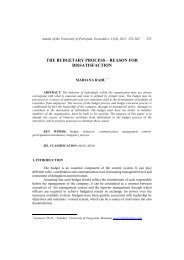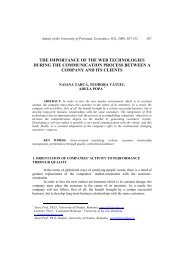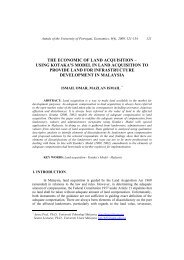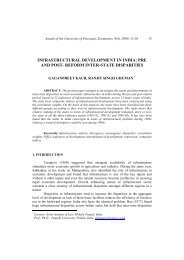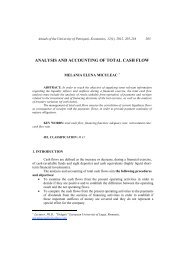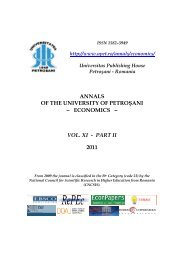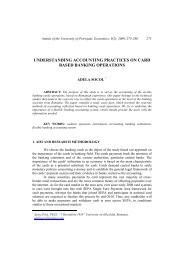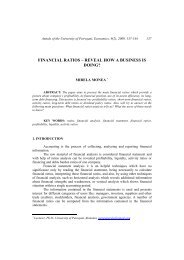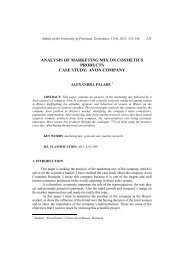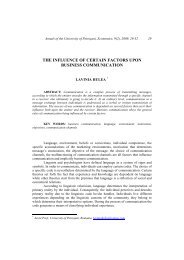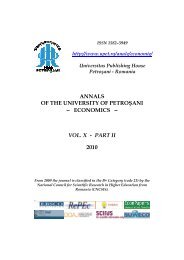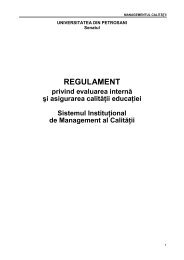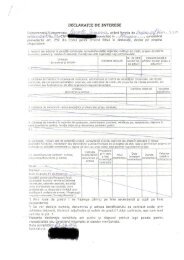annals of the university of petroÅani â¼ economics â¼ vol. xi - part i ...
annals of the university of petroÅani â¼ economics â¼ vol. xi - part i ...
annals of the university of petroÅani â¼ economics â¼ vol. xi - part i ...
You also want an ePaper? Increase the reach of your titles
YUMPU automatically turns print PDFs into web optimized ePapers that Google loves.
194 Njanike, K.; Mutengezanwa, M.; Gombarume, F.B.<br />
This was <strong>the</strong> case before <strong>the</strong> collapse <strong>of</strong> <strong>the</strong> Barbican Bank when Dr Mtuli Ncube was<br />
<strong>the</strong> major share holder and chief executive <strong>of</strong>ficer. The chief executive <strong>of</strong>ficer<br />
dominated in <strong>the</strong> board meetings which resulted in <strong>the</strong> body <strong>of</strong> directors being a rubber<br />
stamping board.<br />
In <strong>the</strong> United Kingdom in 1991, <strong>the</strong> Bank <strong>of</strong> Credit and Commerce<br />
International (BCCI) collapsed due to fraud by top executives costing depositors and<br />
investors large sums <strong>of</strong> money amounting to 6 billion pounds nearly half <strong>the</strong> banks<br />
assets. In <strong>the</strong> 1970s in <strong>the</strong> US, during a period which more than 400 firms engaged in<br />
corrupt activities a commission called Tread Way or Committee <strong>of</strong> Sponsoring<br />
Organizations <strong>of</strong> <strong>the</strong> Tread Way Commission (COSO) was formed to deal specifically<br />
with financial reporting fraud. The first report was published in 1985.<br />
Magaisa (2004) suggests that larger boards are less effective and easier for a<br />
chief executive <strong>of</strong>ficer to control because as boards become too large, it becomes<br />
difficult to coordinate and process problems. This was <strong>the</strong> case with <strong>the</strong> body <strong>of</strong><br />
directors <strong>of</strong> Trust Bank who said <strong>the</strong>y were unaware <strong>of</strong> <strong>the</strong> scenario were a<br />
significant amount <strong>of</strong> <strong>the</strong> banks loans were non performing and were granted without<br />
formal agreement facilities. In his research Pheysey (1993) found a negative<br />
correlation between board and pr<strong>of</strong>itability <strong>of</strong> a firm.<br />
Despite RBZ (2004) critique on multiple appointments Cook, who retired as<br />
chairman and chief executive <strong>of</strong>ficer <strong>of</strong> Deloitte and Touché in 1999 and sits on boards<br />
<strong>of</strong> five American companies, commented that <strong>the</strong>re is considerable value being on<br />
multiple boards and <strong>the</strong> experience across boards can be <strong>of</strong> real value to governance<br />
(Cook, 2002).<br />
As with all o<strong>the</strong>r areas <strong>of</strong> financial institutions activities, body <strong>of</strong> directors has<br />
a critical role to play in overseeing internal control functions <strong>of</strong> <strong>the</strong> bank. The Basel<br />
Committee on Banking Supervision (1999) stipulates that <strong>the</strong> board should develop<br />
effective internal controls and adopt <strong>the</strong> necessary policies and procedures for<br />
conducing such. The internal should be approved and be reviewed periodically by <strong>the</strong><br />
board.<br />
In o<strong>the</strong>r instances top management wilfully violated internal controls as <strong>the</strong>y<br />
tried to be creative and innovative in order to enhance shareholder interests <strong>of</strong> pr<strong>of</strong>it<br />
ma<strong>xi</strong>mizing and in <strong>the</strong>ir desire to please <strong>the</strong> body <strong>of</strong> directors and be rewarded for<br />
good performance. In o<strong>the</strong>r occasions managers will not agree with internal controls<br />
and view <strong>the</strong>m as stringent measures aimed to frustrating <strong>the</strong>ir endeavors.<br />
In some case <strong>of</strong> banks such as Trust Bank <strong>of</strong> Zimbabwe, it was noted that<br />
though <strong>the</strong>re were adequate internal control measures <strong>the</strong>se were however principality<br />
reactive and non-proactive as <strong>the</strong>se measures did not raise alarm to <strong>the</strong> board to take<br />
corrective action before <strong>the</strong> damage had been severe. Also in most instances,<br />
decoctions from such policies and procedures were not independently investigated and<br />
addressed by relevant <strong>part</strong>ies. In <strong>the</strong> case <strong>of</strong> Barbican Bank <strong>the</strong> body <strong>of</strong> directors tried<br />
to “sweep <strong>the</strong> mess under <strong>the</strong> carpet” pretending that everything was well until <strong>the</strong><br />
RBZ surveillance time exposed <strong>the</strong> precarious situation in which <strong>the</strong> bank was<br />
operating under before it went on into liquidation. According to <strong>the</strong> Reserve Bank <strong>of</strong><br />
Zimbabwe majority <strong>of</strong> financial institutions have internal controls and if <strong>the</strong>se internal<br />
controls were religiously adhered to good corporate governance would be <strong>the</strong> order <strong>of</strong>



